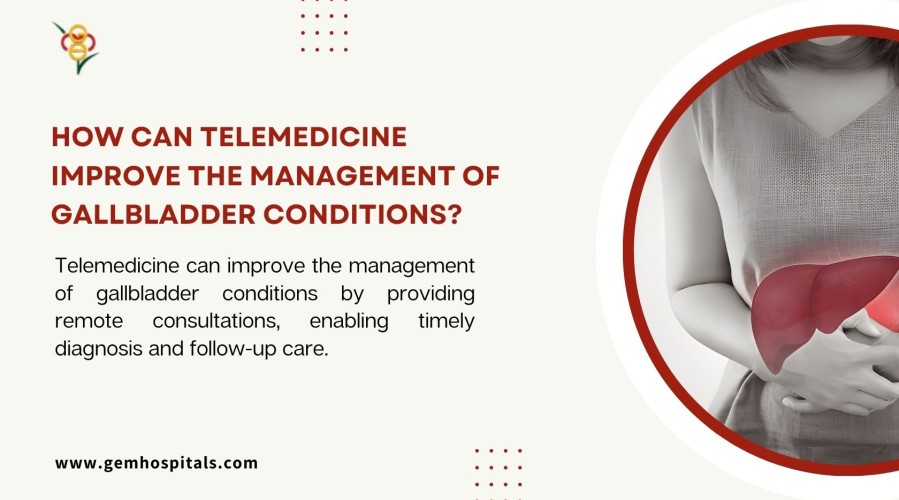Learn effective solutions for digestive problems with expert tips to improve gut health, reduce discomfort, and maintain a healthy digestive system.
How can telemedicine improve the management of gallbladder conditions?

Digital technology keeps on evolving, it is changing the lives of this generation, with this modern digital technology healthcare services are also available remotely which is called telemedicine. With the help of it, various conditions could be managed effectively including gallbladder diseases. The most common gallbladder conditions are gallstones, cholecystitis, and bile duct obstructions which cause significant disturbances in your life when the condition is left untreated. In this case, the launching of telemedicine into gallbladder care offers an alternative for people who find it difficult to reach the hospital often and this is being considered a new opportunity to improve diagnosis, treatment, and follow-up while enhancing patient convenience and access to care, to know more keep reading the content below.
Overview of gallbladder conditions
The gallbladder is a small organ located beneath the liver that stores bile, a digestive fluid produced by the liver. Gallbladder conditions typically arise from issues like gallstones, cholecystitis, biliary dyskinesia, and choledocholithiasis.
These conditions can cause severe abdominal pain, nausea, vomiting, and other digestive symptoms. Treatment may include lifestyle changes, medication, or surgery.
The role of telemedicine in gallbladder care
Telemedicine has emerged as a game-changer in managing gallbladder conditions, offering both patients and healthcare providers a more accessible and efficient way to handle diagnosis, treatment planning, and follow-up. By using technology such as video consultations, remote monitoring, and online communication, telemedicine enables patients to receive timely and personalized care without the need for frequent in-person visits.
- One of the primary ways telemedicine improves gallbladder condition management is through remote consultations that facilitate early diagnosis. Patients experiencing symptoms of gallbladder disease—such as upper right abdominal pain, nausea, or jaundice—can schedule a telemedicine appointment with their healthcare provider for an initial assessment. During these video consultations, healthcare providers can check their doubts.
- When gallbladder removal surgery is recommended, telemedicine can streamline the preoperative process. Virtual consultations can be used to discuss the surgical procedure, risks, benefits, and any necessary preoperative steps, such as fasting or discontinuing certain medications.
- For patients undergoing a cholecystectomy (gallbladder removal), telemedicine allows surgeons to ensure that patients are adequately prepared for surgery without the need for multiple in-person visits. Virtual consultations provide an opportunity to answer questions and alleviate patient concerns in a comfortable, familiar setting.
- One of the most significant benefits of telemedicine for gallbladder care is in postoperative follow-up. After gallbladder surgery, patients often require follow-up care to monitor recovery, manage pain, and ensure there are no complications.
- For patients with chronic gallbladder issues, such as biliary dyskinesia or recurrent gallstones, telemedicine offers a long-term solution for ongoing management. Through telehealth platforms, patients can receive regular check-ins to monitor their condition, discuss any recurring symptoms, and make lifestyle adjustments to reduce the risk of complications.
- Gallbladder diseases often require consultation with specialists, such as gastroenterologists or hepatobiliary surgeons. Telemedicine enhances access to these specialists, particularly for patients living in rural or underserved areas. Instead of waiting for a specialist to visit their local hospital, patients can consult with a highly trained expert through a telemedicine platform, ensuring they receive the best possible care.
Telemedicine has brought an evolution in the field of medicine and the case of gallbladder management it has made a remarkable achievement. Through this access to care, enabling early diagnosis, and enhanced post-surgical follow-up are made easy for patients. Instead of meeting doctors in-patient virtual consultation and remote monitoring are beneficial things for both sides. But when you are feeling some abnormal symptoms or signs there is more than being dependent on telemedicine reaching out to a doctor physically could be the best option.
For early diagnosis or preventive care, consult the specialists at Gem Hospital.
Contact us today for expert guidance and personalized treatment options!
Blogs & Article
Explore current research trends in digestive health, including new treatments, advanced diagnostics, and innovations improving gut health and patient care.
Discover common digestive health myths and the real facts. Learn simple tips to improve gut health and maintain better digestion for a healthier life.


